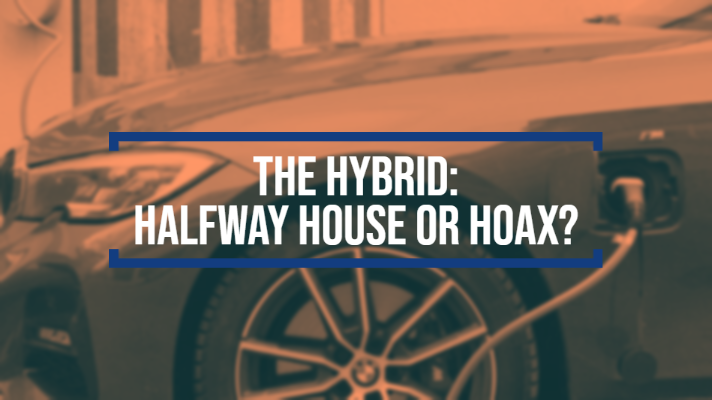The Hybrid: A Halfway House or a Hoax?
As we drive (literally) to a more sustainable future, more and more of us are looking to green our transport. Whether that’s due to environmental concerns, cost concerns, or the stick of a local clean air zone, 75% of us are looking to make the shift in the future. Well then, what are the options? Hybrid, plug-in hybrid, or electric?…
Hybrid Vehicles
Hybrids come in two forms, traditional and plugin. Traditional hybrids are based on very old technology. Although our lovely motoring industry, in an attempt to be as transparent as always, hides the fact behind terms such as “mild hybrid” or even worse “self-charging”. Let’s be frank, Toyota and Lexus have old technology that will only cover more than a couple of miles with fuel, period! The latest spin to rebrand is misleading at best, dishonest at worst. Hybrids do offer some improvements over petrol and diesel for those of us who spend a lot of time in cities. This is because they have small batteries and tech that charges them when you brake, giving you a small amount of electric range from the heat that would otherwise be wasted. However, with higher speed motorway driving they can be less efficient and most clean air zones exclude them.
Mild or self-charging hybrids are, in the author’s view, outdated and should be confined to museums. Or perhaps prison cells for crimes against the motorist and marketing. At least the marketing agencies who portray them as “self-charging” should languish in custody. In an era of countless examples of stretching the truth from manufacturers, “self-charging” hybrids are, even by the extraordinary standards of the motor industry, a step too far!
Plug-in Hybrid Vehicles
Plug-in Hybrids are, on the face of it, a halfway house. They mirror normal cars, in that they have a petrol or diesel engine, but have a smaller tank. The rest of the space is given to batteries and an electric motor. Most plug-in hybrids can cover 20-miles plus on pure electric, equal to most commutes! When you go further though, the car automatically switches over to petrol or diesel.
There are good and bad plug-in hybrids. The best offer 30-miles plus of electric range and the ability for you to control when to use electricity or traditional fuel. Keep the electric for city driving and use the fuel on motorways, you’ll see some great economy! But again, the figures of 150mpg plus are incredibly misleading. While on electricity, your costs will be tiny. Once it’s gone, you’ll be lucky to get 40mpg. However, ramp up the regenerative braking and factor in all the low-cost electric-only commutes, and you’ll enjoy fuel savings of around 60% for the typical motorist when compared to traditional cars!
Electric Cars
Many people have outdated views of electric cars, thinking the only options are cars with tiny range or cars costing as much as a small house. In reality, things have moved on. If you have a drive or garage, we strongly believe electric cars will work for you. It doesn’t matter how many miles you drive, with many electric cars covering nearly 300 miles between charges and regaining up to 200 miles in 20 minutes when charging publicly.
Electric cars are ridiculously cost-effective on our scheme, covering over 100 miles from £200 a month. They have unrivalled performance and convenience too. Yet again though, there are some gaps. If you need to tow anything large, forget about pure electric; whatever you do, DO NOT believe manufacturer claims on the range.
Don’t let this put you off!!
We’ve tested them all and here to help! So, if you’re replacing your car, what should you choose? If you have a drive or garage (or nearby charge point) it has to be electric. Why spend serious money on old technology that’s rapidly being replaced and excluded from many city centres? If you’re not ready and looking for a 3-year lease, then plug-in hybrids are good value, especially on our scheme. But if you choose the “self-charging” hybrid, you’re not so much saving the planet as demonstrating the power of marketing and spin over fact and substance.
Tags : electric car, hybrid car, plug-in hybrid

